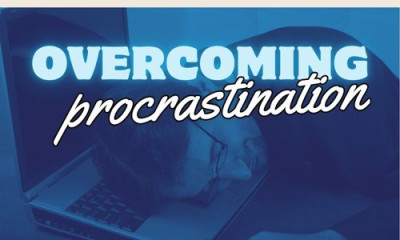This course includes
What you will learn ?
Curriculum for this course
Description
4 Challenges
Day 1-5 mins
Day 2-5 mins
Day 3-8 mins
Day 4-14 mins
Procrastination can lead to a range of negative consequences, both personally and professionally. Some of the most common include:
1. Increased Stress and Anxiety
Delaying tasks often leads to last-minute efforts, which can create a sense of overwhelm and anxiety. This stress can impact both mental and physical health.
2. Lowered Productivity
4 Challenges
Day 1-5 mins
Day 2-5 mins
Day 3-8 mins
Day 4-14 mins
Procrastination can lead to a range of negative consequences, both personally and professionally. Some of the most common include:
1. Increased Stress and Anxiety
Delaying tasks often leads to last-minute efforts, which can create a sense of overwhelm and anxiety. This stress can impact both mental and physical health.
2. Lowered Productivity
Postponing work leads to rushed efforts, which may compromise the quality of the final product. Deadlines can also be missed, further impacting productivity.
3. Reduced Quality of Work
Rushed tasks usually result in lower quality outcomes. Procrastination leaves less time for thorough research, revisions, and attention to detail.
4. Negative Impact on Mental Health
Procrastination is often linked with feelings of guilt, frustration, or shame, especially if it becomes a habitual behavior. These emotions can contribute to burnout and a negative self-image.
5. Hindered Personal Growth
Delaying tasks or goals can prevent you from learning new skills, taking on challenges, or progressing in your career or personal life.
6. Strained Relationships
Failing to meet deadlines or fulfill responsibilities can cause frustration in professional settings or tension in personal relationships.
7. Missed Opportunities
When you procrastinate, you may miss out on important opportunities—whether it's a job promotion, learning experience, or the chance to make a positive impression.
8. Financial Consequences
In business or personal finances, delaying important tasks like paying bills, submitting proposals, or investing can lead to financial losses or missed profits.
Building self-discipline and time management strategies can help reduce procrastination and its negative effects.
Read more +
Read less -
4 Challenges
Day 1-5 mins
Day 2-5 mins
Day 3-8 mins
Day 4-14 mins
Procrastination can lead to a range of negative consequences, both personally and professionally. Some of the most common include:
1. Increased Stress and Anxiety
Delaying tasks often leads to last-minute efforts, which can create a sense of overwhelm and anxiety. This stress can impact both mental and physical health.
2. Lowered Productivity
Postponing work leads to rushed efforts, which may compromise the quality of the final product. Deadlines can also be missed, further impacting productivity.
3. Reduced Quality of Work
Rushed tasks usually result in lower quality outcomes. Procrastination leaves less time for thorough research, revisions, and attention to detail.
4. Negative Impact on Mental Health
Procrastination is often linked with feelings of guilt, frustration, or shame, especially if it becomes a habitual behavior. These emotions can contribute to burnout and a negative self-image.
5. Hindered Personal Growth
Delaying tasks or goals can prevent you from learning new skills, taking on challenges, or progressing in your career or personal life.
6. Strained Relationships
Failing to meet deadlines or fulfill responsibilities can cause frustration in professional settings or tension in personal relationships.
7. Missed Opportunities
When you procrastinate, you may miss out on important opportunities—whether it's a job promotion, learning experience, or the chance to make a positive impression.
8. Financial Consequences
In business or personal finances, delaying important tasks like paying bills, submitting proposals, or investing can lead to financial losses or missed profits.
Building self-discipline and time management strategies can help reduce procrastination and its negative effects.
